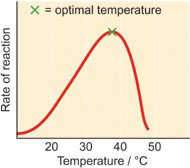The enzyme range present in the human body is 25-35°C. How is it possible they are working properly within the temp of 37°C as they are temperature specific? Thanks.
1 Answer
Here's what I find.
Explanation:
Temperature dependence of enzyme activity
The body contains about 75 000 enzymes.
Each one controls a specific type of reaction, and each has an optimum temperature at which it works best.
Most enzymes will tolerate lower temperatures. Their reaction rate will decrease, but they will still work.
Enzyme activity decreases rapidly at temperatures above the optimum.
The active site changes shape, and substrates cannot bind to it — the enzyme becomes denatured. Denaturation often occurs around 45 °C.

Thus, there is a range of temperatures over which an enzyme can function effectively.
Optimum temperature
The situation would be ideal if all body enzymes had their optimum temperature at the body temperature of 37 °C.
However, different enzymes work best at different temperatures, and some are more sensitive than others to temperature changes.
The enzymes that are most affected by temperature changes are often those that catalyze the less critical bodily functions.
Thus, when the metabolism slows down, people often develop symptoms like dry skin, nails, and hair, hair loss, and fluid retention.
The enzymes that control body functions necessary for survival (such as vision, hearing, heart function, and breathing), are less sensitive to temperature changes.
They keep working when other enzymes have stopped.

